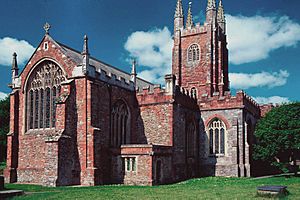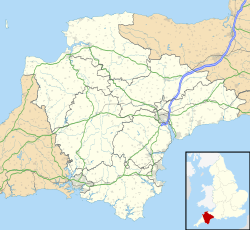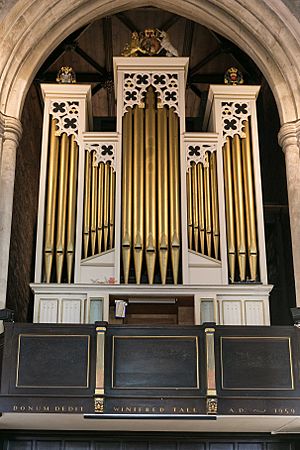St Mary's Church, Totnes facts for kids
Quick facts for kids St Mary’s Church, Totnes |
|
|---|---|

St Mary’s Church, Totnes
|
|
| 50°25′54.4″N 3°41′17″W / 50.431778°N 3.68806°W | |
| OS grid reference | SX 80219 60473 |
| Location | Totnes |
| Country | England |
| Denomination | Church of England |
| History | |
| Dedication | Saint Mary the Virgin |
| Architecture | |
| Heritage designation | Grade I listed |
| Designated | 7 January 1952 |
| Specifications | |
| Spire height | 120 feet (37 m) |
| Administration | |
| Parish | Totnes |
| Deanery | Totnes |
| Archdeaconry | Totnes |
| Diocese | Exeter |
| Province | Canterbury |
St Mary's Church in Totnes, Devon, is a very old and important church. It is a Grade I listed building, which means it is considered to be of special historical interest. The church belongs to the Church of England and is part of the Diocese of Exeter.
Contents
The Church's Long History
Building a New Church in the 1400s
The church you see today was built a long time ago, in the 1400s. Before that, there was a Benedictine Priory of St Mary here. The people of Totnes decided to completely rebuild their church. This big project happened in different stages.
First, the main part of the church, called the nave, was built between 1432 and 1444. Then, the chancel, which is the area around the altar, was completed from 1445 to 1448. The tall tower was built between 1449 and 1459. Finally, the screen inside the church was added from 1459 to 1460.
A skilled builder named Roger Crowden is known for designing the tower. Because the rest of the church looks very similar, he might have designed the whole building. The large pillars inside the church are like those in St Mary's Church, Brixham, suggesting they might have had the same architect.
Special Features and Changes Over Time
Inside the church, you can find a special monument for Walter Smith, who passed away in 1555. It's a tomb with beautiful patterns carved into it. A large brass candelabra, which is a fancy candle holder, was put in the church in 1701.
Later, in 1824, an extra part was added to the north side of the church. This area was changed again in 1869 by a famous architect named Sir Gilbert Scott. He added more seats, which meant some old seating areas could be removed.
The Church Organ
St Mary's Church has a very impressive pipe organ. It's likely that there was an organ in the church even before the 1500s. The first organ after that time was put in place in 1720, and it was used until 1817. After that, a new organ was installed by Flight and Robson.
The organ used today is very special. It was originally built by a famous organ maker known as Father Henry Willis for the Great Exhibition in London in 1851. This huge exhibition showed off amazing new inventions and designs. The organ was then moved to Totnes and started being used on August 11, 1861.
Over the years, the organ has been repaired and updated. It now has three keyboards (called manuals) and pedals, with 33 different sounds it can make. Many talented organists have played this instrument over the centuries.
The Church Bells
The tower of St Mary's Church holds a set of 8 bells. These bells have been added at different times. Four of them are very old, made in 1732 by Abraham Rudhall. Two more were made in 1863 by John Warner and Sons. Another bell from the same company was added in 1897. The newest bell was made in 1935 by Gillett & Johnston. When rung together, they create a beautiful sound that can be heard across Totnes.
 | Sharif Bey |
 | Hale Woodruff |
 | Richmond Barthé |
 | Purvis Young |



